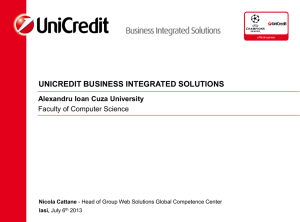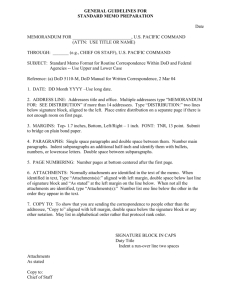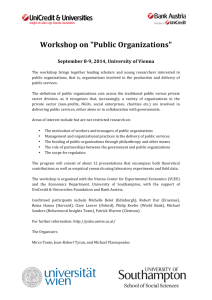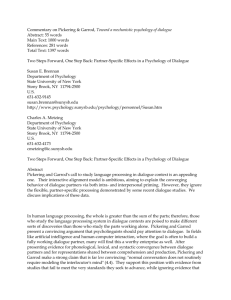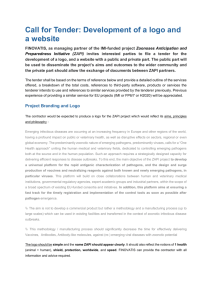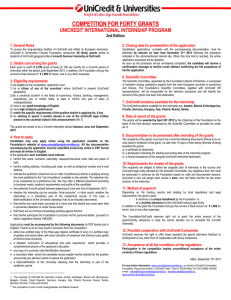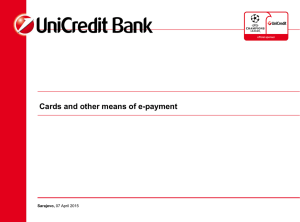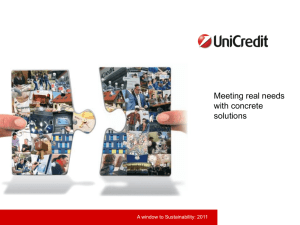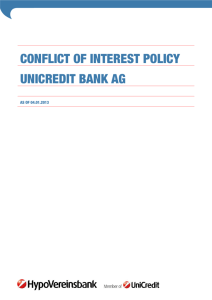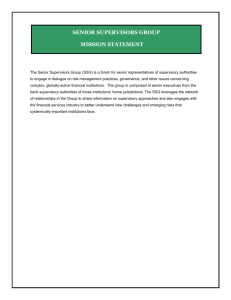Code of Ethics pursuant to Italian legislative decree no
advertisement
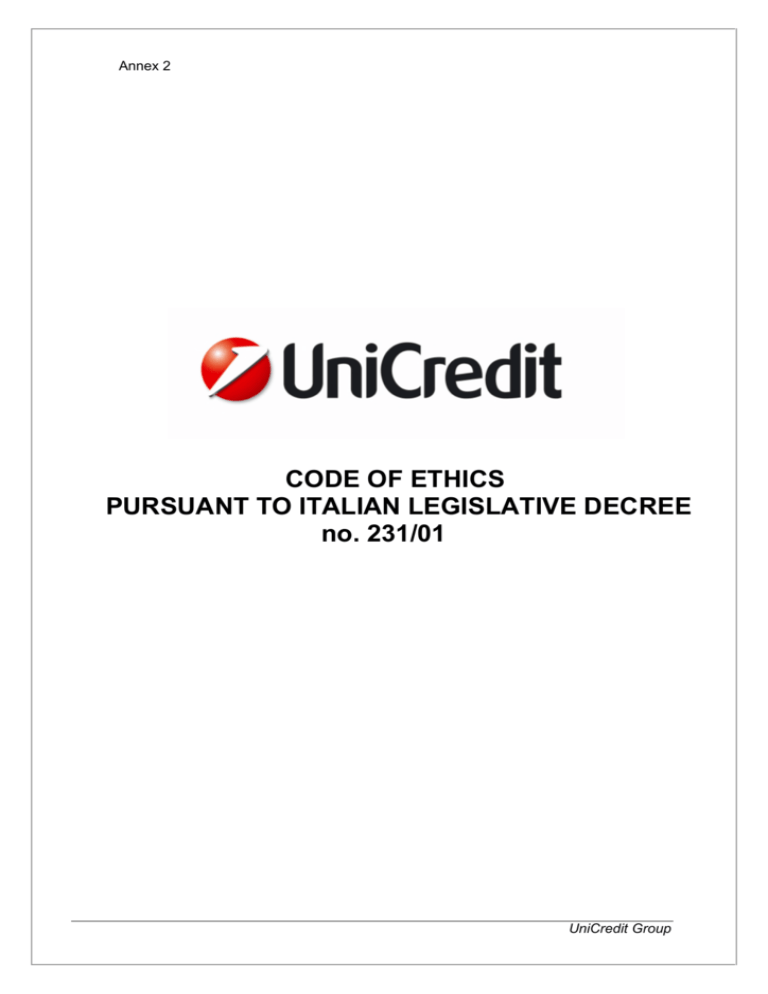
Annex 2 CODE OF ETHICS PURSUANT TO ITALIAN LEGISLATIVE DECREE no. 231/01 UniCredit Group CONTENTS 1 PREAMBLE ..................................................................................................................2 1.1 AIMS AND CONTENT.............................................................................................................................................. 2 1.2 ADDRESSEES ............................................................................................................................................................ 2 2 GENERAL PRINCIPLES ..............................................................................................3 2.1 COMPLIANCE WITH THE LAWS AND REGULATIONS IN FORCE ............................................................ 3 2.2 INTEGRITY ............................................................................................................................................................... 3 2.3 OBJECTIVITY AND MANAGING CONFLICTS OF INTEREST...................................................................... 3 2.4 CONFIDENTIALITY AND PRIVACY IN MANAGING INFORMATION ....................................................... 4 2.5 COMPETITION LAWS ............................................................................................................................................ 4 2.6 FIGHT AGAINST ORGANIZED CRIME .............................................................................................................. 4 3 MANAGEMENT OF EXTERNAL RELATIONS ...........................................................4 3.1 RELATIONS WITH CUSTOMERS ........................................................................................................................ 4 3.2 RELATIONS WITH THE PUBLIC ENTITIES ..................................................................................................... 6 3.3 RELATIONS WITH THE SUPERVISORY AUTHORITIES AND THE JUDICIAL AUTHORITIES........... 7 3.4 RELATIONSHIPS WITH SUPPLIERS AND OTHER PROVIDERS OF GOODS OR SERVICES............... 8 All persons involved in the activity of selection, stipulation and execution of contracts for the provision of goods and services to the Bank, with any third-party public or private counterparty (including consultants, collaborators, suppliers and commercial/financial partners) must abide by clear, sound and non-discriminatory procedures based on absolute impartiality, autonomy, transparency and independent judgment, avoiding situations of conflict of interest. Transparency in dealings with suppliers or other third parties, must be ensured through: ............................................................................................................................................................................. 8 3.5 MANAGEMENT OF RELATIONS WITH THE MEDIA AND THE MARKET ............................................... 8 3.6 MANAGEMENT OF GIFTS AND ENTERTAINMENT EXPENSES ................................................................. 9 3.7 MANAGEMENT OF SPONSORSHIPS AND CHARITABLE DONATIONS .................................................... 9 4 MANAGEMENT OF CORPORATE REQUIREMENTS AND INSIDER INFORMATION ...................................................................................................................9 4.1 MANAGEMENT OF ACCOUNTING AND INTERNAL CONTROLS .............................................................. 9 4.2 MANAGEMENT OF CORPORATE COMMUNICATIONS ............................................................................. 10 4.3 MANAGEMENT OF CORPORATE TRANSACTIONS AND RELATIONS WITH SHAREHOLDERS AND OTHER CORPORATE BODIES ................................................................................................................................. 10 4.4 MANAGEMENT OF TRANSACTIONS WITH RELATED PARTIES AND AFFILIATED ENTITIES AND OBLIGATIONS OF BANKING EXPONENTS .......................................................................................................... 11 4.5 MANAGEMENT OF INSIDER INFORMATION AND MARKET OPERATIONS........................................ 11 5 MANAGEMENT AND PROTECTION OF HUMAN RESOURCES, CORPORATE ASSETS AND THE ENVIRONMENT ................................................................................12 1 UniCredit Group 5.1 HUMAN RESOURCE SELECTION AND MANAGEMENT ............................................................................. 12 5.2 PROTECTION OF HEALTH AND SAFETY AT WORK .................................................................................. 12 5.3 MANAGEMENT AND PROTECTION OF CORPORATE ASSETS ................................................................ 13 5.4 PROTECTION OF COPYRIGHT AND INDUSTRIAL PROPERTY RIGHTS............................................... 13 5.5 PROTECTION OF THE ENVIRONMENT .......................................................................................................... 14 1 PREAMBLE 1.1 AIMS AND CONTENT This document is an integral part of the Organization and Management Model (hereinafter the “Model”) adopted by UniCredit S.p.A. (hereinafter also “UniCredit” or the “Bank”) pursuant to Italian Legislative Decree no. 231 of June 8, 2001 (hereinafter “Italian Legislative Decree 231/01”) and contains the rules intended to ensure that the conduct of all addressees of the Model (see next paragraph) is always guided by criteria of fairness, collaboration, loyalty, transparency and mutual respect, as well as to avoid conducts that could constitute the offences and crimes set forth in Italian Legislative Decree 231/01. The provisions in this document supplement the Bank’s Integrity Charter and Code of Conduct, as well as the principles of control and conduct contained in the Decision Protocols. If anyone among the recipients finds himself/herself in a situation that is not specifically covered in this document, he/she will still have to act in compliance with the principles which have inspired and guided the drafting thereof. In order to ensure compliance with the rules of the following Code of Ethics, the Bank undertakes to ensure that all addressees of this document: • are aware of it; • receive the requested clarification with respect to the conduct of their work, in a timely manner. 1.2 ADDRESSEES The principles and contents of this document are addressed to the following persons (hereinafter also the “Addressees”): • • members of the Bank’s Corporate bodies; all UniCredit’s employees, intended as: − − − • the employees, including the top management and the employees of foreign branches; employees under fixed-term employment contract; employees of Group companies on secondment with UniCredit; within the scope of existing relationships with the Bank, third parties, including, without limitation: − self-employed staff or quasi-employees, − professionals, − consultants, − agents, − suppliers, − business partners, who take part in carrying out the Bank’s activities, on the basis of contractual relations. 2 UniCredit Group Regardless of the sanctions envisaged by the applicable laws and regulations in force, failure to observe, or breach by the addressees of the Model of the provisions contained in this document, shall be considered as non-fulfilment of the ethical principles of conduct adopted by the Bank, of the duties of fairness towards it, as well as breach of specific contractual clauses where provided. Therefore, such breaches and/or violations shall be subject to the penalty system described in the specific sections of the Model, to which reference is made for the appropriate details. 2 GENERAL PRINCIPLES 2.1 COMPLIANCE WITH THE LAWS AND REGULATIONS IN FORCE The Addressees are required to comply with the rules applicable in all countries in which the Bank operates and/or in which they (for example in the case of third parties) provide their work on behalf and/or in the interest of the Bank. The persons classified as Addressees and belonging to UniCredit S.p.A. (hereinafter “Internal Addressees”) are also required to know and comply with company procedures as applicable to them in relation to the function performed and their level of responsibility. These persons are also expected to be up to date with the Bank’s internal regulations at all times, by using the information tools provided by the Bank (regulations, policies, internal orders, etc.), so as to ensure the proper performance of their work and the adoption of conducts that are in accordance with the company guidelines on work organization. In this regard, the Heads of each Organizational Entity undertake to ensure that all addressees of the Model: • are provided with training on Italian Legislative Decree 231/01, so that the procedures and principles prescribed by the Organization Model are always observed; • are kept informed on the communication channels through which they can submit their reports on any breaches of the principles and procedures prescribed by the Code of Ethics and the Organization Model. All addressees who act in the interest and on behalf of the Banks are committed to strict compliance with the laws and regulations applicable in the countries in which UniCredit S.p.A. carries on its business. 2.2 INTEGRITY All addressees are required to base their conduct on the principles of good faith, honesty, integrity, transparency, fairness and impartiality. 2.3 OBJECTIVITY AND MANAGING CONFLICTS OF INTEREST All Addressees are required to act in a fair and unbiased manner and to avoid finding themselves in situations of conflict of interest, whether actual or even just potential. The Addressees shall therefore avoid any conflict of interest that could impair their independence of judgment and choice, and that is incompatible with their duties. Circumstances constituting conflict of interest are intended to also include, in addition to those provided by the law, cases in which a person acts to satisfy an interest other than that of the Bank. These conflict of interest situations, whether actual or just potential, shall be managed by also taking into consideration the provisions established in the Bank’s Guidelines and Policies. 3 UniCredit Group The Addressees who find themselves obliged to act in situations of even only potential conflict of interest must strictly abide by the laws governing such circumstances and, in general, the principle of transparency understood to mean the prior communication of the conflict, the prior obtaining of authorization for execution, and, lastly, the subsequent communication of the terms of the executed transaction. 2.4 CONFIDENTIALITY AND PRIVACY IN MANAGING INFORMATION The Addressees are required to strictly comply with applicable external regulations regarding privacy. Internal Addressees must also ensure that the information acquired as part of their work be exclusively used in carrying out such activity, in full compliance with the procedures established by the Bank in accordance with the legislation in force on the protection of personal data. 2.5 COMPETITION LAWS Addressees are required to conduct their business in full compliance with applicable competition laws and regulations. Any act of intimidation (e.g., violence or threats) against competitors of the Bank is also forbidden. 2.6 FIGHT AGAINST ORGANIZED CRIME The Bank firmly condemns and, as part of its business operations, combats any form of organized crime1, also Mafia crime, with all the tools at its disposal. To this end, particular attention should be paid by Recipients if operating in geographic areas, both in Italy and abroad, historically affected by phenomena of organized crime, in order to prevent the risk of criminal infiltration. Addressees are therefore required to verify the requisites of moral integrity and reliability with reference to both staff and business counterparties, such as customers, suppliers, agents, consultants and business partners, as well as the legitimacy of the activities carried out by the same. 3 MANAGEMENT OF EXTERNAL RELATIONS 3.1 RELATIONS WITH CUSTOMERS 3.1.1 Defining and managing contractual relations with customers Relations with customers of the Bank (regardless of their public or private nature) must be based on criteria of honesty, courtesy, transparency, fairness, professionalism and collaboration. The persons in charge of relations with customers must ensure compliance with all the rules concerning fairness, completeness, adequacy and transparency in the performance of services. In particular Addressees are required to: • • 1 comply with all internal procedures prescribed by UniCredit S.p.A. when dealing with customers in the provision of all services (i.e. investment and ancillary services, banking services, etc.); inform Bank customers about the real nature, risks, and costs of the transactions and services offered by the Bank. See Annex 1 of the Model "List of predicate offenses and individual offenses". 4 UniCredit Group In addition, all Addressees are strictly forbidden to: • • • • • • • propose commercial opportunities or opportunities of any other kind to the representatives of customer companies which may provide them, even just potentially, with an undue advantage in order to obtain benefits for the Bank; offer or promise money or other benefits in favour of representatives of customer companies, including through third parties, in order to influence the customer’s independent judgment and obtain an advantage for the Bank; provide or promise to provide, request or obtain confidential information and/or documents that may compromise the integrity or reputation of one or both parties; exhibit incomplete documents and data and/or communicate false and forged data to customers; remove or omit to exhibit mandatory information; request or press for favourable treatment or omit information that must be provided in order to unduly influence third-party decisions to enter into agreements, contracts and arrangements with the Bank; adopt deceptive conduct that may even potentially mislead customers in their technical/economic assessment of the products or services offered or supplied or otherwise implement elusive practices in order to exert influence on customers’ judgments or actions. Without prejudice to the Rules of Conduct and the principles mentioned above, with specific reference to the establishment of commercial relations with public counterparties, both in participating in public tenders and/or competitions organized by the Public Entities, as well as in all negotiations or contractual relationship which may be conducted/entered into with such parties, all Addressees involved must act in good faith and in compliance with current laws and regulations, also ensuring suitable tracking of official information flows to and from the Public Entities. 3.1.2 Compliance with anti-money laundering and counter-terrorism laws The Bank avoids entertaining relations with those involved in illegal activities. Addressees are required to exercise their activity with customers in full compliance with the legislation in force issued by the competent authorities, as well as with the internal procedures on anti-money laundering and terrorism financing. Therefore, it is strictly forbidden to perform any transaction in favour of customers of UniCredit S.p.A. if it is certain, or even only suspected, that the funds used may come from unlawful activities, or that the customer is acting for money laundering purposes or to carry out acts of terrorism. If it is impossible to refrain from execution of the transaction deemed suspicious, internal Addressees must take action in accordance with the Bank's internal procedures. Therefore, when Addressees are involved, in various capacities, in the management of customer relationships, they are required to: • • • preventively verify the information available for the customers; use the procedures prescribed to carry out checks on the origin of the money deposited with or the money used by customers to perform transactions with the Bank; avoid involvement in transactions in which there is the risk of favouring the laundering of money from unlawful and criminal activities. 3.1.3 Management of cash and equivalents The Addressees, with particular reference to the Bank’s employees who, as part of their work, manage or receive/deliver cash and equivalents on behalf of the bank, must pay adequate attention to verifying the authenticity and suitability thereof and adopt the conducts specified in the internal regulations. 5 UniCredit Group 3.2 RELATIONS WITH THE PUBLIC ENTITIES Relations with the Public Entities as well as Public Officials and Public Service Officers both Italian and foreign, must be based on maximum transparency and fairness, in respect of the roles and levels of responsibility assigned within the Bank. In general, all Addressees involved in managing relations with Public Entities, in whatever field of activity, are required to act in good faith and in compliance with current laws and regulations. With regard to the Public Entity, it is strictly forbidden to: • • • • • • • exhibit incomplete documents and data and/or communicate false and forged data; remove or omit to exhibit true documents; omit information that must be provided; be represented by consultants or third parties when situations of conflict of interest may arise; to give, offer or promise money or other benefits (e.g. donations, promises of employment, assignment of consultancy appointments, assignment of job orders, business proposals, etc.) for the purpose of obtaining or maintaining an unfair advantage in conducting business; to request or press for favourable treatment or omit pieces of information that must be provided, in order to unduly influence the decision to enter into agreements, contracts, conventions with the Bank, or for the purpose of unduly influencing the decision to accept applications for contributions and/or subsidies or in order to obtain authorizations / licences / concession for the Bank; having obtained the loans requested, use them for purposes other than those for which they were disbursed and granted. Only those individuals who have been authorized beforehand may have dealings with Public Entities, according to their respective corporate responsibilities and in compliance with company procedures. The Heads of each Organizational Function/Organizational Entity who have regular contact with the Public Entities should not only maintain adequate conduct with respect to the Public Entity, but also provide their collaborators with clear and unequivocal instructions on the operating conduct to be adopted in formal and informal contacts with Public Official / Public Service Officer, taking into account the specific characteristics of their area of activity, transferring knowledge of the rules and awareness of the situations at risks of perpetration of offences. In carrying out their activities, the Internal Addressees shall ensure adequate mechanisms to ensure traceability of official information flows towards the Public Entities. Specifically the Addressees are required to respect following principles: • • • if contact with the Public Official / Public Service Officer occurs in the form of a meeting, two Bank employees must participate at any such meeting; derogations to this principle are permitted in substantiated cases (e.g. substantiated lack of personnel, confidentiality of information, incompatibility with other company regulations, participation in teams/ meetings that also involve parties outside the Bank etc.); traceability of the essential elements of meetings with Public Official or Public Service Officer, recording relevant information relating to any such meetings, including at least: date and place of meeting, purpose of the same and participants; in communications with Public Entities and/or their representatives, o o 6 ensure that hard copy communications are sent with double signature, or single signature, in cases where there is a special power of attorney; all e-mail correspondence must be conducted via email: - using a shared email address adopted within each Organizational Unit or - your own email address, in copy to the shared email address, or that of the manager or - from a certified e-mail account where required. UniCredit Group Except in cases where the Decision Protocols provide for different rules in relation to particular situations, all Internal Addressees must strictly comply with the above provisions. If any third party is involved in relations with the Public Entity, in no case is it permitted to pay fees in favour of such third parties which are not adequately justified in relation to the type of task already performed or to be performed. Payment of a fee must be subject to an estimate issued by the organizational unit responsible for assessing the quality of the performed service and thus the price fairness. Finally, it is forbidden to follow up on any request for undue advantages or attempted undue persuasion by a Public Entity officer; any request for undue advantages or any intimidating or harassing conduct by a Public Entity officer of which one has become aware, must immediately be reported to one’s Manager. The latter is in turn required to forward the received report to the designated organizational entity for appropriate action. 3.3 RELATIONS WITH THE SUPERVISORY AUTHORITIES AND THE JUDICIAL AUTHORITIES Relations with the Regulatory Authorities and the Judicial Authorities must be based on the principles of integrity, transparency, fairness, professionalism and cooperation, in strict compliance with the procedures laid down by the applicable legislation, using and submitting complete documents and statements. In particular, when managing relations with the Supervisory Authorities it is forbidden to hinder in any manner their inspective and supervisory activity. In any case, the Addressees are forbidden to putting in place/ collaborating/causing others to engage in conducts that may fall within the offences envisaged by Italian Legislative Decree 231/01. By way of non limiting example, they are forbidden to: • • • • • • state untrue facts/information in the communications with the Supervisory Authority; conceal important facts/information to the Supervisory Authority; omit mandatory facts/information in the communications with the Supervisory Authority; engage in deceitful behaviour that is likely to mislead the representatives of the Supervisory Authority; request or induce the representatives of the Supervisory Authority to provide a favourable treatment; promise or pay/deliver/receive sums of money, gifts or free services and grant benefits of any nature to representatives of the Supervisory Authority on a personal basis with the purpose of promoting or furthering the Bank’s interests. in dealings with the Judicial Authorities, it is expressly forbidden to: • • • present incomplete documents and data and/or provide false and/or altered data; remove or fail to present complete, accurate and truthful documents; fail to provide the required information. During all proceedings before the Judicial Authorities it is forbidden to put in place (directly or indirectly) any illegal activity that could unduly favor or damage one of the parties in question, even by means of third parties (e.g. external professionals). It is also forbidden to unduly favor the interests of the Bank by inducing the person called to make statements which can be used in criminal proceedings before the Judicial Authorities with violence or threats or, alternatively, with an offer of money or other benefits, to make statements or to make false statements. In addition, the persons receiving requests for undue advantages or subject to intimidating or harassing conduct on the part of the Supervisory Authority or the Judicial Authorities must immediately report it. 7 UniCredit Group 3.4 RELATIONSHIPS WITH SUPPLIERS SERVICES AND OTHER PROVIDERS OF GOODS OR All persons involved in the activity of selection, stipulation and execution of contracts for the provision of goods and services to the Bank, with any third-party public or private counterparty (including consultants, collaborators, suppliers and commercial/financial partners) must abide by clear, sound and non-discriminatory procedures based on absolute impartiality, autonomy, transparency and independent judgment, avoiding situations of conflict of interest. Transparency in dealings with suppliers or other third parties, must be ensured through: • the adoption of predefined rules and mechanisms for the selection and management of suppliers/third parties, taking into account their technical, financial and asset solidity as well as social responsibility criteria; • the definition and implementation of policies and systems for the ongoing quality monitoring of the goods and services provided. In the procedure to select contractual counterparties and before any business relationship is established with them, all the available information must be subject to prior inspection, in order to ascertain competences and suitability with regard to proper and precise execution of the contractual obligations and of the duties entrusted, as well as to avoid any implication in transactions that may even potentially favour money-laundering or use of money originating from criminal activities. In no case may relations be engaged with persons or entities that do not intend to comply with said principles or that do not provide suitable guarantees regarding the existence of the aforementioned requisites. When payments are executed, the effective performance of the services and the payments regularity must be verified by the persons responsible, who will ensure correspondence between the addressee/orderer and the counterparty effectively involved in the transaction. In relations with third parties it is also forbidden to: • • • appoint suppliers of goods and services and third party professionals, bypassing the ordinary selection process based on objective and documentary criteria with regard to the professionalism, quality and affordability of the goods/services provided; providing the compliance certification when receiving goods/services without carefully assessing the substantive and formal compliance of the goods/services received; authorize payment of goods/services without checking compliance of the goods/services provided with the contractual terms or which cannot be adequately justified in the context of the contractual relationship. 3.5 MANAGEMENT OF RELATIONS WITH THE MEDIA AND THE MARKET Relations with the press, and more in general with the means of mass communication and information, must be managed in full compliance with the principles of transparency, accuracy, completeness and timeliness. The activity of communication and disclosure of information relating to UniCredit must be exclusively reserved to persons authorized to do so, who will ensure compliance with laws in force and with corporate procedures. It is expressly forbidden to state false information or conceal data and information that may mislead the addressees of those communications, or in the prospectuses required for the purpose of invitation to invest, admission to trading or at the time of public purchase or exchange offers. 8 UniCredit Group 3.6 MANAGEMENT OF GIFTS AND ENTERTAINMENT EXPENSES In the normal course of business relationships, offering free gifts or incurring entertainment expenses (e.g. lunches, dinners with clients/other third parties) may not, under any circumstances, exceed the normal business or courtesy practices, nor may it be used as a tool to obtain favourable treatment for the Bank. Gifts and entertainment may be offered or accepted only if they are reasonable and if they are a customary practice in business relationships. 3.7 MANAGEMENT OF SPONSORSHIPS AND CHARITABLE DONATIONS All sponsorships must be aimed at promoting UniCredit S.p.A. and its products and services. In no event should sponsorships be made in order to obtain an unlawful advantage. Donations must be made to entities or institutions whose incorporation act or bylaws provide for the pursuit of purposes mainly related to assistance, charity, education, culture, recovery of the artistic heritage, study or scientific research, or the implementation of projects of social utility. In general, Sponsorship and charitable donations may only be made if they: • support respectable organizations/events; • are transparent; • comply with local laws and regulations. Sponsorships and charitable donations are not permitted if they: • may be considered as exerting undue influence or imposing an improper obligation on the addressee or as a reward for an activity; • are in cash or equivalent form; • compromise the integrity and reputation of the Bank. All payments for sponsorships or the disbursement of charitable donations must be accurately and fully recorded and must be disclosed in the accounting books and records by the relevant departments. 4 MANAGEMENT OF CORPORATE REQUIREMENTS AND INSIDER INFORMATION 4.1 MANAGEMENT OF ACCOUNTING AND INTERNAL CONTROLS Accounting is based on the general principles of truthfulness, accuracy, completeness, transparency and clarity of the basic information for the corresponding accounting entry. All Addressees are obliged to work towards the purpose of guaranteeing, in performance of the company’s business and the inspection procedures, compliance with the laws and internal procedures, as well as fair and accurate management of accounting and financial data. It is forbidden for Addressees in charge of accounting of corporate events, preparation of accounts and financial statements, as well as the audit of UniCredit, to: • • altering, amending or omitting accounting data or information of which the disclosure is mandatory by law; making false declarations or concealing information concerning the assets, liabilities, financial position and profit and loss. All Addressees inside the Bank and in particular those who are also responsible for administrative/accounting functions, must ensure that corporate events are: • • 9 appropriately and punctually recorded; accompanied by suitable supporting documents that allow, at any time, control of the characteristics and motivations of each transaction, as well as identification of the person who authorized, recorded and subsequently controlled execution of the transaction. UniCredit Group In addition, financial movements related to the Bank's transactions must be put in place using tools that allow full traceability, as well as in compliance with current legislation and, in particular, with the provisions of banking, financial and money-laundering legislation. 4.2 MANAGEMENT OF CORPORATE COMMUNICATIONS All Addressees involved in preparation of the financial statements, reports, and other corporate communications on assets, liabilities, financial position and profit and loss of Bank and Group addressed to shareholders or the public must: • • • • conduct themselves correctly, guaranteeing completeness, transparency and clarity of the information provided, accuracy of the data and its processing, strictly applying the principles provided for the preparation of said documents by the Italian Civil Code and by the special laws governing said activity; punctually provide the authorized addressees with the information requested so as to facilitate performance of the activity of control, verification and audit that must be carried out by both the addressees responsible for performing said activities, and the authorities responsible for controlling and supervising banks; provide within UniCredit deeds, documents and information that is truthful, complete and consistent with the entries made so that the results of the financial statements, including the consolidated financial statements, are not altered; ensure that the information provided to customers and to market operators, through their work, is truthful, clear, transparent and that it strictly reflects the real position and performance of UniCredit. Specifically, the Directors and their collaborators: • • • • in drawing up the financial statements, reports to the market and other similar documents, must represent the assets, liabilities, financial position and profit and loss in a true, clear and complete way; must punctually comply with the requests for information from the Board of Statutory Auditors and facilitate in any way performance of the control and audit activities legally assigned to the shareholders, to other corporate bodies or Supervisory Body; submit to the Shareholders’ Meeting deeds and documents that are complete and consistent with the accounting entries; provide the supervisory bodies with correct and complete information on assets, liabilities, financial position and profit and loss. 4.3 MANAGEMENT OF CORPORATE TRANSACTIONS SHAREHOLDERS AND OTHER CORPORATE BODIES AND RELATIONS WITH In addition, all Addressees involved in the above activities are required to comply with legislation for protection of the integrity and effectiveness of share capital. In general, Directors must: • • • 10 inform the other Directors and the Board of Statutory Auditors of any interest held, on their own behalf or on that of third parties, in a transaction involving the Company, specifying the nature, terms, origin and scope thereof; in the case of the Chief Executive Officer, the same must also refrain from carrying out the transaction, vesting the collegiate body with the same. In the case of the Sole Director, the same must also give notification in the next Shareholders' Meeting (the Board resolution must adequately justify the reasons and profitability for the company of the transaction); act and decide with full knowledge of the facts and in autonomy, pursuing the primary objective of creating value for shareholders; ensure, within the scope of board resolutions, completeness and clarity of the information to be provided to the Shareholders' Meeting, as well as accuracy of data and its processing. UniCredit Group In addition, all Addressees are strictly forbidden to: • • • • • • • • perform corporate transactions to the detriment of the shareholders, creditors or the market; perform unlawful transactions on shares or investments of UniCredit or of other Group companies; return contributions to shareholders or release them from the obligation to execute them, excepting cases of legitimate reduction of share capital, and perform share capital reductions or mergers with another company or reverse mergers, in breach of provisions of the law for protection of creditors; distribute profits or advances on profits that have not actually been achieved or destined by law to reserve, or distribute reserves that are not distributable pursuant to law; make UniCredit purchase or subscribe shares or corporate quotas, issued by the company, outside the cases permitted by law; fictitiously form or increase the share capital of UniCredit through transactions that are not permitted by law; provide, in relations with the shareholders and statutory auditors (for example during inspections or any requests to exhibit corporate books) data or information concerning the financial position and profit or loss of UniCredit that are untruthful or incomplete, that may mislead the addressees; hinder or obstruct performance of the control and audit activities. 4.4 MANAGEMENT OF TRANSACTIONS WITH RELATED PARTIES AND AFFILIATED ENTITIES AND OBLIGATIONS OF BANKING EXPONENTS The Bank ensures utmost fairness and transparency in the management of transactions with related parties and affiliated entities and in management of the obligations of banking exponents pursuant to Article 136 of the Consolidated Banking Act, giving appropriate communication to the market, where required. Bank Addressees, within the scope of each competent organizational unit by type of transaction, have the responsibility for timely communication of transactions involving conflicts of interest and completeness of the contents to the competent organizational unit of the Bank. Addressees are also responsible for providing updates of the information provided in a timely manner in order to allow compliance with the matter. In this regard, Addressees are required to comply with the internal rules relating to "conflicts of interest”. 4.5 MANAGEMENT OF INSIDER INFORMATION AND MARKET OPERATIONS When managing inside information, all Addressees involved must comply with applicable internal and external regulations, i.e. with the confidentiality obligation and carefully conserve documents containing confidential and reserved information, ensuring that their access codes remain secret and that their computer is adequately protected, in line with internal regulations on physical and logical security. In addition, as provided for by the internal regulation on "market abuse", It is furthermore strictly forbidden to: • make use of insider information to purchase, sell or perform other transactions on financial instruments for own or third party account, including through third parties; • disclose this information to third parties for reasons other than those related to the performance of office duties (e.g.: customers, issuers of listed securities, sales, traders, research analysts or other people who work on the public side of the market) or recommend or induce third parties to carry out transactions on the basis of such information; • communicate such information to third parties in the performance of office duties (consultants and/or external professionals) without making sure those parties are required to respect the confidentiality of the information received; 11 UniCredit Group • • • • • 5 disclose incorrect information or implement sham transactions or other artifices potentially capable of causing alteration of the price of financial instruments; perform trading transactions that allow, through the actions of one or more person acting in concert, to establish the market price of one or more financial instruments at an anomalous or artificial level; perform transactions or trading orders that use artifices or other forms of deception or contrivance; perform trading transactions that provide or are capable of providing false or misleading indications on the offer, demand or price of financial instruments; implement other artifices capable of providing false or misleading indications on the offer, demand or price of financial instruments. MANAGEMENT AND PROTECTION OF HUMAN RESOURCES, CORPORATE ASSETS AND THE ENVIRONMENT 5.1 HUMAN RESOURCE SELECTION AND MANAGEMENT The Bank’s search and selection of staff is guided by criteria of objectivity, competence and professionalism, applying the principle of equal opportunity without favouritism, with the aim of securing the best people in the labour market and complying with the relevant legislation. It should be noted that, also in order to achieve the mentioned objectives, it is forbidden to recruit as employee of UniCredit, before at least 1 year has passed, former public administration or Regulatory Authority employees who have personally and actively participated in business negotiations or who participated, even individually, in authorization of public administration processes or inspections, involving UniCredit. With specific reference for former members of the top and/or senior management of Consob, the Bank of Italy and Ivass, this prohibition is for two years from their leaving office. As part of the staff selection and recruitment process, the Bank also undertakes to hire staff that, if non-EU, has a valid residence permit throughout the period of employment. In addition, the management and development of human resources is a strategic factor for the Bank. For this reason, business plans and appropriate training programs are promoted to develop the skills and competences of every employee. All employees are offered equal opportunities and professional development, on the basis of merit. In order to maintain a positive working environment, the Internal Addressees (especially those who hold positions of responsibility) are required to contribute to strengthening the sense of belonging and team spirit, by adopting conducts based on mutual respect of personal dignity and reputation and mutual cooperation. As a result, the Addressees is required to: • • • • fully cooperate to ensure the correct application of the personnel management tools adopted by the Bank; share information and promote dialogue and exchange of views, paying attention to the contributions of each employee; promote the integration of new colleagues in a spirit of collaboration and accessibility; avoid any form of discrimination against colleagues. 5.2 PROTECTION OF HEALTH AND SAFETY AT WORK The Banks places great importance on the creation and management of environments and workplaces that adequately ensure the health and safety of employees, in accordance with applicable national and international regulations. The persons in charge of health and safety must ensure safe and healthy workings conditions, that are respectful of personal dignity, as well as work environments that are safe and without risks to health, in compliance with applicable regulations and existing technology. 12 UniCredit Group In addition, all Addressees are obliged to comply with accident-prevention regulations (laws, regulations, orders and rules) in force and to abstain from implementing imprudent or negligent conduct that could damage the physical and mental integrity of themselves or of others or that could even only constitute a risk or danger of occurrence of said harmful events. The Bank ensures a suitable working environment from the point of view of health and safety through a system of monitoring, management and prevention of risks related to the performance of business activities. In light of the above, all Addressees who work at the Bank’s premises (headquarters or networks), are required to: • • • • • comply with the regulations and instructions issued by the Employer, the Managers and the Supervisors for collective and individual protection purposes; correctly use, in performing their role, the machinery, equipment, tools, vehicles, other work equipment, and safety devices; immediately report to the Employer, manager or person in charge any defects, deficiencies or operational issues in using equipment or devices, and any other dangerous conditions of which they become aware; participate in training and education programmes organized by the Employer; undergo a medical examination that is preventive or periodic, or otherwise arranged by the Chief Physician, if subject to mandatory health monitoring ex TUS. Furthermore, the mentioned individuals are forbidden to: • • remove or modify any safety, warning or control device without authorization; perform operations or manoeuvres on their own initiative that are not within their responsibility or which may jeopardize their own and other employees’ safety. 5.3 MANAGEMENT AND PROTECTION OF CORPORATE ASSETS The Addressees are responsible for the protection of the corporate resources with which they are entrusted and are expected to guarantee their integrity and proper functioning, abstaining from improper conduct that does not comply with corporate procedures. In addition, the network IT resources must be used properly, in compliance with the provisions of internal corporate procedures and in observance of the safety measures adopted by UniCredit. Specifically, the Addressees who make use of the company IT assets in the performance of their duties, are required to use the IT resources assigned to them (e.g., fixed or portable personal computers) in a proper manner and exclusively for the performance of their duties, paying attention not to cause any damage to Unicredit and its information system. 5.4 PROTECTION OF COPYRIGHT AND INDUSTRIAL PROPERTY RIGHTS The management and use of corporate and/or third party assets must take place in full compliance with the laws and regulations concerning the protection of copyright and industrial property rights, basing relations with authors, rights holders and competitors on the principles of lawfulness, fairness and transparency. By way of example, it is strictly forbidden to: • • • 13 use, in any form or manner and for any purpose, any intellectual property and material protected by copyright and by any intellectual and industrial property rights, including image rights and right to a name, without the consent of the right holders or of those who are legally entitled to those rights; reproduce, store, transmit or distribute copies of copyrighted material, unless prior permission of the copyright holder has been given, to the extent permitted by copyright laws; purchase or favor the circulation of goods for which the provenance has not been proven in compliance with regulations on intellectual property. UniCredit Group 5.5 PROTECTION OF THE ENVIRONMENT The Addressees are required to fully and substantially comply with legislative requirements on the environment. In this respect, they must carefully consider the environmental consequences of each choice made in the course of their work, both in relation to the consumption of resources and the production of emissions and waste directly related to their activities (direct impacts) as well as those related to activities and conducts that are not directly controlled, as they are carried out by third parties, customers and suppliers (indirect impacts). Given the foregoing, the Internal Addressees are required to: • manage waste in accordance with internal regulations, using recycling, (paper, plastic, glass, aluminium), waste paper and waste toner containers in compliance with the relevant provisions; • pay special attention to “hazardous” waste (by way of non limiting example: toner, neon tubes, air conditioning systems, computer and electronic equipment in general, etc.); • make sure, before entrusting waste of any kind to any third party, that such persons are in possession of the necessary licenses and that their activity is governed by a contract with the Bank; • report the presence of waste on sites owned or leased to the Bank, to the relevant Building Manager, also providing the relevant details. In addition, Internal Addressees are forbidden to use any type of substance that is harmful to the ozone layer (e.g., products containing CFCs) except those expressly specified by the company. 14 UniCredit Group
